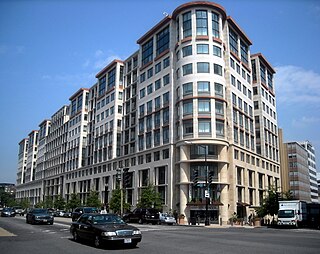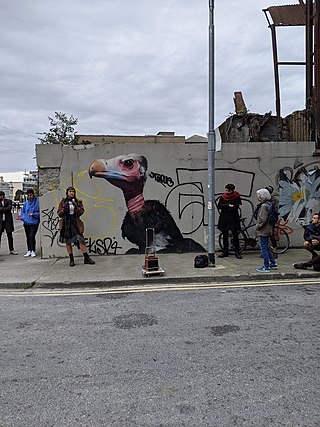Related Research Articles
A hedge fund is a pooled investment fund that holds liquid assets and that makes use of complex trading and risk management techniques to improve investment performance and insulate returns from market risk. Among these portfolio techniques are short selling and the use of leverage and derivative instruments. In the United States, financial regulations require that hedge funds be marketed only to institutional investors and high-net-worth individuals.

The International Finance Corporation (IFC) is an international financial institution that offers investment, advisory, and asset-management services to encourage private-sector development in less developed countries. The IFC is a member of the World Bank Group and is headquartered in Washington, D.C. in the United States.
In the field of finance, private equity (PE) is capital stock in a private company that does not offer stock to the general public. Private equity is offered instead to specialized investment funds and limited partnerships that take an active role in the management and structuring of the companies. In casual usage, "private equity" can refer to these investment firms rather than the companies that they invest in.
An institutional investor is an entity that pools money to purchase securities, real property, and other investment assets or originate loans. Institutional investors include commercial banks, central banks, credit unions, government-linked companies, insurers, pension funds, sovereign wealth funds, charities, hedge funds, real estate investment trusts, investment advisors, endowments, and mutual funds. Operating companies which invest excess capital in these types of assets may also be included in the term. Activist institutional investors may also influence corporate governance by exercising voting rights in their investments. In 2019, the world's top 500 asset managers collectively managed $104.4 trillion in Assets under Management (AuM).
Distressed securities are securities over companies or government entities that are experiencing financial or operational distress, default, or are under bankruptcy. As far as debt securities, this is called distressed debt. Purchasing or holding such distressed-debt creates significant risk due to the possibility that bankruptcy may render such securities worthless.

A vulture fund is a hedge fund, private-equity fund or distressed debt fund, that invests in debt considered to be very weak or in default, known as distressed securities. Investors in the fund profit by buying debt at a discounted price on a secondary market and then using numerous methods to subsequently sell the debt for a larger amount than the purchasing price. Debtors include companies, countries, and individuals.

Oaktree Capital Management, Inc. is an American global asset management firm specializing in alternative investment strategies. As of March 31, 2023, the company managed $172 billion for its clientele.

Lone Star Funds, legal name of main entity Lone Star Global Acquisitions, Ltd. is an American private equity firm that invests in distressed assets in the U.S., Canada and internationally. The founder of Lone Star established its first fund in 1995 and Lone Star has to date organized 21 private equity funds with total capital commitments since inception of over $86 billion. Lone Star's investors include corporate and public pension funds, sovereign wealth funds, university endowments, foundations, fund of funds and high-net-worth individuals. Lone Star Funds has affiliate offices in North America, Europe and Japan.

Paul Elliott Singer is an American hedge fund manager, activist investor, and the founder, president, and co-CEO of Elliott Management. As of March 2024, Forbes estimated his net worth at US$6.1 billion. Fortune described Singer as one of the "smartest and toughest money managers" in the hedge fund industry. A number of sources have branded him a vulture capitalist, largely on account of his role at Elliott Management, which is a vulture fund. The Independent has described him as "a pioneer in the business of buying up sovereign bonds on the cheap, and then going after countries for unpaid debts".

Apollo Global Management, Inc. is an American asset management firm that primarily invests in alternative assets. It provides investment management and invests in credit, private equity, and real assets. As of 2022, the company had $548 billion of assets under management, including $392 billion invested in credit, including mezzanine capital, hedge funds, non-performing loans, and collateralized loan obligations, $99 billion invested in private equity, and $46.2 billion invested in real assets, which includes real estate and infrastructure. The company invests money on behalf of pension funds, financial endowments, and sovereign wealth funds, as well as other institutional and individual investors.
Nedžad Branković is a Bosnian politician who served as Prime Minister of the Federation of Bosnia and Herzegovina from 2007 to 2009. He previously served as Federal Minister of Traffic and Communication from 2003 to 2007.
Avenue Capital Group is an American multinational investment firm focusing on distressed securities and private equity with regional teams focusing on opportunities in the United States, Europe and Asia. The firm operates as both a private equity firm and as a hedge fund. Avenue's core strategy is focused on distressed debt and equity securities although the firm also manages investment funds that focus on long-short opportunities, real estate, and collateralized debt obligations. The firm manages assets valued at approximately $9.5 billion. The firm was founded by former professionals of Amroc Investments, an affiliate of the Robert M. Bass Group.
Blackstone Credit, formerly known as GSO Capital Partners (GSO) is an American hedge fund and the credit investment arm of The Blackstone Group. Blackstone Credit is one of the largest credit-oriented alternative asset managers in the world and a major participant in the leveraged finance marketplace. The firm invests across a variety of credit oriented strategies and products including collateralized loan obligation vehicles investing in secured loans, hedge funds focused on special situations investments, mezzanine debt funds and private equity funds focused on rescue financing.
MatlinPatterson is a distressed securities fund that participates in distressed and credit opportunities on a global basis. The firm was established in 2002 as a spinout from Credit Suisse First Boston. It is headquartered in New York City and has offices in London and Hong Kong. MatlinPatterson was founded by David Matlin and Mark Patterson. MatlinPatterson, through MatlinPatterson Global Advisers, manages private equity vehicles with a distressed-for-control mandate as well as an open-ended strategy seeking non-control credit investment opportunities.
Elliott Investment Management is an American investment management firm. It is also one of the largest activist funds in the world.

Corporate finance is the area of finance that deals with the sources of funding, and the capital structure of corporations, the actions that managers take to increase the value of the firm to the shareholders, and the tools and analysis used to allocate financial resources. The primary goal of corporate finance is to maximize or increase shareholder value.

Greylock Capital Management, LLC is a U.S. Securities and Exchange Commission registered alternative investment adviser that invests globally in high yield, undervalued, and distressed assets worldwide, particularly in emerging and frontier markets. The firm was founded in 2004 by Hans Humes from a portfolio of emerging market assets managed by Humes while at Van Eck Global. AJ Mediratta joined the firm in 2008 from Bear Stearns and serves as its president.

An Irish Section 110 special purpose vehicle (SPV) or section 110 company is an Irish tax resident company, which qualifies under Section 110 of the Irish Taxes Consolidation Act 1997 (TCA) for a special tax regime that enables the SPV to attain "tax neutrality": i.e. the SPV pays no Irish taxes, VAT, or duties.

Matheson, is an Irish law firm partnership based in the IFSC in Dublin, which specialises in multinational tax schemes, and tax structuring of special purpose vehicles. Matheson is estimated to be Ireland's largest corporate law firm. Matheson state in the International Tax Review that their tax department is: "significantly the largest tax practice group amongst Irish law firms".

Qualifying Investor Alternative Investment Fund or QIAIF is a Central Bank of Ireland regulatory classification established in 2013 for Ireland's five tax-free legal structures for holding assets. The Irish Collective Asset-management Vehicle or ICAV is the most popular of the five Irish QIAIF structures, it is the main tax-free structure for foreign investors holding Irish assets. A QIAIF constitutes an alternative investment fund (AIF) under the Alternative Investment Fund Managers Directive (AIFMD) and is required to appoint an alternative investment fund manager (AIFM). The AIFM may be either an EU manager or a non-EU manager.
References
- 1 2 Mao, Debra (21 March 2011). "Vulture Fund May Cause 'Constitutional Crisis' in Hong Kong". Bloomberg. Retrieved 19 July 2014.
- 1 2 "Vulture funds – the key players". The Guardian. 15 March 2011. Retrieved 19 July 2014.
- 1 2 "FG Capital". FG Capital Management, LTD. Retrieved 19 July 2014.
- 1 2 Huang, Daniel, What Happens When the Vulture Funds Start Circling, Wall Street Journal, June 25, 2014
- ↑ "FG Capital". FG Capital.
- ↑ Palast, Greg; O'Kane, Maggie; Madlena, Chavala (15 November 2011). "UK urged to prevent vulture funds preying on world's poorest countries". The Guardian. Retrieved 29 August 2014.
- ↑ Jones, Meirion (18 July 2012). "Vulture fund's $100m DR Congo claim blocked". BBC. Retrieved 29 August 2014.